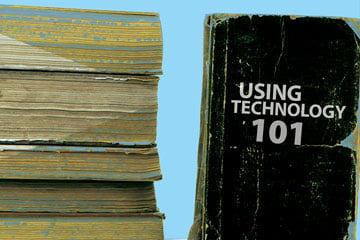Law schools and regulators are beginning to accept that lawyers need much better training and knowledge in how to use technology.

Law schools and regulators are beginning to accept that lawyers need much better training and knowledge in how to use technology.
As technology is increasingly used within law practices to streamline legal processes and more efficiently deliver services to clients, two important questions have come up for lawyers and law schools. Do lawyers and law students have the technical skills to meet the business needs for the current legal market? And with technology now highly integrated into the practice, is there then an ethical imperative for lawyers to be technically competent?
Technical skills
New and emerging technological developments and tools, combined with pressures to decrease legal costs, mean many law firms are trying to understand how to best introduce and integrate new technologies into their practices. However, it may surprise many to hear that most lawyers and law students lack the technical skills to meet the business needs of the current legal market. There are two reasons for this.
First, despite the pressures faced by firms to embrace these advancements, there are still those comfortable using existing — and increasingly outmoded — methods and processes.
Even within firms that are willing to introduce new technologies, convincing lawyers to use them has proved challenging. This resistance is known as the problem of adoption.
For many lawyers, the problem of adoption stems from a culture that nurtures the image of the “ingenious lawyer who triumphs by intellect rather than by procedural discipline.” To overcome this image, lawyers need to understand that there is still room for unique judgment, analysis and creativity when using technological systems. In fact, using technology for many of the more rote aspects of a file can free lawyers up to apply these higher-level skills to any issue. The other obstacle to technology adoption is the misconception that young, new lawyers are familiar with and proficient in the use of the latest technologies. These “digital natives,” tethered to their smartphones and using apps such as Uber for ordering a ride, Tinder for dating or Snapchat for social media engagement, are seen as easily able to understand and engage with legal technology.
While not unreasonable, this assumption holds little truth; age does not appear to be a strong factor contributing to the problem of adoption. Young lawyers are not always open or motivated to train themselves on the use of legal technology applications or even basic applications such as MS Word or Excel. And while mobile apps such as Uber, Tinder and Snapchat have simple interfaces and features designed to be intuitive, legal technology applications and productivity software have interactivity capabilities that are much greater and far more complicated. However, few students ever truly learn how to engage with the full functionality of these applications and software. Their understanding and use of these technologies is often simplistic and fails to leverage tools and functionality for real-time savings as part of their legal practice.
Second, even though almost all of the work lawyers perform today involves digital tools, few law schools (with the notable exceptions of Osgoode Hall Law School, the University of Calgary and Thomson Rivers University) offer any type of substantive training in the use of technologies. This may be due to a perception that the use of technology is exclusively part of STEM curriculum or a support function, as opposed to a core lawyering skill. As legal professionals, put aside such thinking and help expand the legal professions’ well-defined, yet passive body of knowledge. Additionally, academic faculty may lack an understanding of the more practical components and the changing landscape of legal practice. As a result, they may underestimate or dismiss the importance of such courses to inquiring students. In turn, law students may fail to demand the inclusion of substantive technological training as part of the curriculum, which may strengthen the confirmation bias within academia that favours maintaining the status quo. Consequently, law students may complete three years of law school and easily avoid having to take courses with any kind of training in the use of technology.
I have been working with Osgoode Hall Law School to deliver two courses in the use of technologies. The first course, Legal Information Technology, which I originally taught alongside Darin Thompson and James Williams and now offer with Nicole Aylwin, focuses on challenging law students to devise a technological solution to an access to justice problem using software design processes and principles. Along the way, students would also be introduced to the changes taking place within the legal industry prompted by technological innovation. Osgoode has since expanded its course offerings to include a designing legal services course, as well as a survey course on law and innovation. The second course is a week-long intensive course that I piloted for the first time this past May, called Tech Transformation: Lawyering in the 21st Century. The course is aimed at introducing law students to the changing legal landscape and helping them understand how technology can be applied to law by teaching basic technology skills, showcasing available legal technologies and developing technical problem-solving abilities.
One of the most difficult tasks in developing and delivering legal technology training courses is assessing what technical skills law students will need, what skills they have and what skills such a course should focus on developing. The skills in demand range from the basic tools that lawyers use day to day, such as MS Word and Excel, to legal research to leveraging artificial intelligence and understanding security and privacy issues. To test their basic legal technology competency, I had students complete the Procertas LTA — or Legal Technology Assessment — for MS Word, Excel and Adobe. This assessment and training tool, developed by Casey Flaherty, helps determine whether or not an individual holds a basic level of technological competency. In my experience, many students are surprised to realize how large the gap is between their existing knowledge and skills and basic competency. Students can then use the training functionality to improve their skills. The LTA is a great learning tool and may be the only tool that focuses on training technical skills for these applications.
While the LTA helped students develop skills using tools with which they were already somewhat familiar, it was more challenging to introduce them to new and more advanced technologies such as artificial intelligence. For this, I worked with Professor Benjamin Alarie of the University of Toronto, and founder of Blue J Legal. We had students complete a research exercise first using more traditional legal research tools and then using Blue J Legal. In this way, students were able to engage with, compare and gain a direct appreciation for artificial intelligence and the increased speed with which it can deliver results. To explore issues around privacy and security, the class had a representative of Thomson Reuters (publisher of Canadian Lawyer) speak about cybersecurity, and students then participated in a mock exercise where a law firm is the target of ransomware.
Ethical imperative
The introduction of courses offering training in the use of technologies in law schools comes at a propitious time. The Federation of Law Societies of Canada has proposed amending the Model Rules of Professional Conduct — the enforceable rules of conduct that set out the baseline standards of professionalism to which lawyers in Canada must adhere — to include technical competency as a component of the definition of “competency.” According to the FLSC report entitled “Model Code of Professional Conduct Consultation Report”:
“The Standing Committee considers a lawyer’s understanding and maintenance of technological competence to be an ethical issue of significant importance that should be specifically referenced in the Model Code.”
If this proposed change is adopted, provincial regulators will have to consider whether to similarly amend their rules of professional conduct. Such a duty of technical competency has already been added to the American Bar Association Model Rules. Since then, 28 states have adopted the same into their rules of professional conduct. Florida has gone even further to say that a certain number of lawyer continuing professional development hours must be related to approved technology programs.
If and when this change to professional competency does occur, the first step for lawyers will be to understand what it means to be technically competent. Currently, an American organization, LTC 4, provides guidance on what it means to have basic legal technological competency and develops modules to train lawyers to meet this. They do this by organizing core competencies into workflows that are continuously updated using common technologies used by law firms.
Increasingly, large law firms are recognizing the need to look to technology to provide missed opportunities for efficiency and to provide a competitive edge. With the changes to the model rules, more law schools and regulators may now begin to adapt their curriculum and ask themselves what competency means. Eventually, law schools and law school students will need to embrace technology and problem-solving tools early, and to grapple with what exact technologies should be included.
Monica Goyal is an entrepreneur, lawyer and tech innovator and founder of My Legal Briefcase and Aluvion. She began her career as an engineer doing research and development for Toshiba, Nortel and Nokia. She will be speaking on this topic at the 2017 Emerging Legal Technology Forum in Toronto on Sept. 21.











